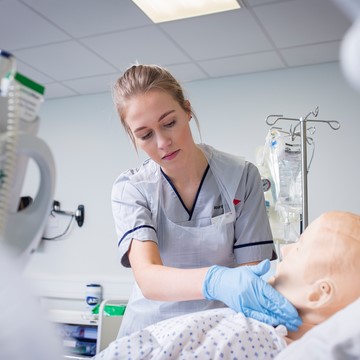Fitness to Practice
The Nursing and Midwifery Council’s overall aim is to protect the health, safety and wellbeing of the public by promoting trust and confidence in the nursing and midwifery professions. This is achieved through ‘Fitness to Practice’ regulations. These regulations are based around 12 principles to ensure nurses and midwives adopt a professional culture which prioritizes patient safety and embeds the principles of equality, diversity and inclusion when working alongside patients and service users.What does Fitness to Practice mean for student nurses and midwives?
Fitness to practice means ensuring that student nurses and midwives must develop skills, knowledge, good health and character to do their job safely and effectively. Student fitness to practice is called into question if health, disability, conduct or character issues compromise their ability to:
- meet the required Nursing and Midwifery Council (NMC) competencies/proficiencies
- practice safely in order to protect the public
If fitness to practice is called into question, it may affect their ability to continue as a student nurse or midwife. The NMC do not investigate student fitness to practice issues. This is the role of each university.

Health Concerns
The NMC and universities welcome and value the contribution which all students can make during their studies and in their chosen profession. Universities and practice partners want to support students and provide them with the best opportunity to flourish.
Some students may already have a condition which changes or indeed worsens during the programme, or they may develop a health condition during this time. When students apply through UCAS, they can declare a health or disability diagnosis in the ‘disability/special needs’ section. This will enable them to access any support they may require. It is important that the university is aware of any such conditions which might affect their fitness to practice so that the programme teams can support them and ensure all students are able to practice safely and protect the public through considering any reasonable adjustments. Having insight into how their own wellbeing affects others is an important skill for nurses and midwives to develop.
For further information and details of the process and procedure, please see the Fitness to Practice policy on the relevant university intranet, or contact the following fitness to practice leads:
Some students may already have a condition which changes or indeed worsens during the programme, or they may develop a health condition during this time. When students apply through UCAS, they can declare a health or disability diagnosis in the ‘disability/special needs’ section. This will enable them to access any support they may require. It is important that the university is aware of any such conditions which might affect their fitness to practice so that the programme teams can support them and ensure all students are able to practice safely and protect the public through considering any reasonable adjustments. Having insight into how their own wellbeing affects others is an important skill for nurses and midwives to develop.
For further information and details of the process and procedure, please see the Fitness to Practice policy on the relevant university intranet, or contact the following fitness to practice leads:
Reporting specific issues and concerns
Student nurses and midwives have a duty to report anything they are concerned about relating to themselves, another student, nurse or midwife which might create a risk to patient safety/public protection or which may impact on fitness to practice. This is known as ‘Duty of Candour’ which is ratified by both the NMC and General Medical Council (GMC).
An additional reporting issue is related to any cautions, police warnings or criminal convictions – all of these must be reported to their programme lead for documentation and investigation as appropriate. It is always wise to report these issues as part of the annual Good Health, Good Character reporting system.
Student Responsibilities
take responsibility for their own mental and physical health and wellbeing, seeking support where necessary to ensure this does not impact on their academic or practice learning
- be aware of the impact of social/digital media on their role as a student nurse/midwife and the impact of any misuse on their ability to join the NMC register
- be aware of the requirement to act with honesty and integrity, remain objective and maintain clear professional boundaries with the people in their care
- understand the professional responsibility to adopt a healthy lifestyle to maintain the level of personal fitness and wellbeing required to meet people’s mental and - physical care needs (NMC 2018)
- be aware of the impact of social/digital media on their role as a student nurse/midwife and the impact of any misuse on their ability to join the NMC register
- be aware of the requirement to act with honesty and integrity, remain objective and maintain clear professional boundaries with the people in their care
- understand the professional responsibility to adopt a healthy lifestyle to maintain the level of personal fitness and wellbeing required to meet people’s mental and - physical care needs (NMC 2018)
University Responsibilities
Each university must have a fitness to practice policy in order to be validated by the NMC to offer nursing and midwifery education programmes. Details can be found in the student programme handbook and on the university website. Referrals to fitness to practice committees are taken seriously. There are a range of outcomes, depending on the situation – extremely serious issues could result in a student being removed from the programme of study.
Fitness to Practice Key Contacts
QMU Fitness to Practice Lead
Ruth Magowan - RMagowan@qmu.ac.uk
UoE Fitness to Practice Lead
Dr Elaine Haycock Stuart E.A.Haycock-Stuart@ed.ac.uk
OU Fitness to Practice Lead
NHS Lothian: Fiona MacKinnon Fiona.mackinnon@open.ac.uk
NHS borders: Lorraine Malcolm Lorraine.malcolm@open.ac.uk
ENU Fitness to Practice Lead
Gavin Cullen G.Cullen2@napier.ac.uk
